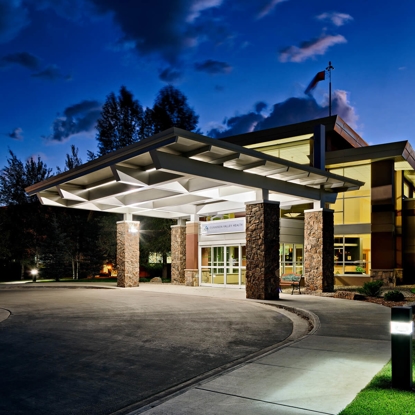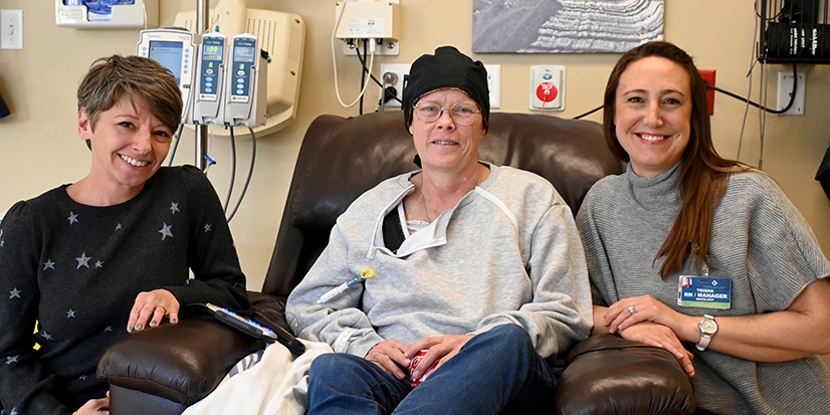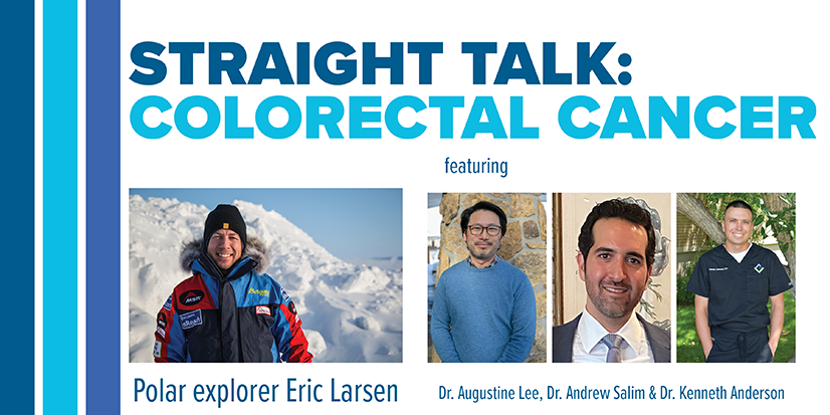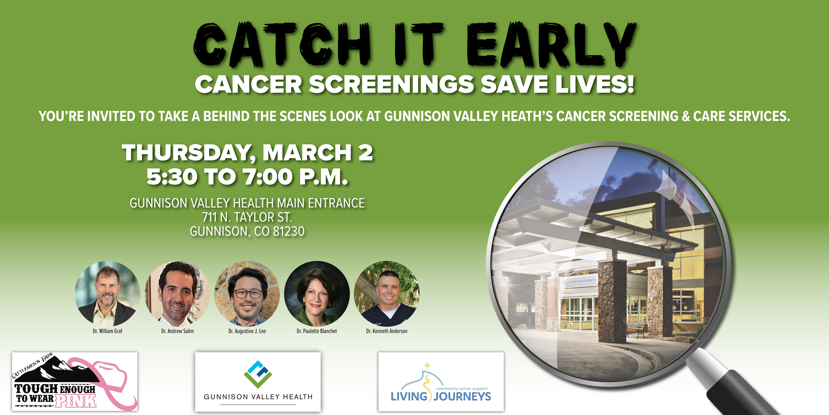Cancer Screening Guidelines
Screening guideline information courtesy of the American Cancer Society
Breast Cancer
A mammogram is conducted to help screen for or to diagnose breast cancer. Many small tumors can be seen on a mammogram before they can be felt by a woman or her health care professional.
Screening Guidelines
- Women aged 40 to 44 should have the choice to start annual breast cancer screening with mammograms if they wish to do so.
- Women aged 45 to 54 should get mammograms every year.
- Women 55 and older should switch to mammograms every 2 years or can continue yearly screening.
We offer 3D Tomosynthesis Mammography, the latest in breast imaging technology. Funding for our 3D Tomosynthesis machine was generously donated by Cattlemen's Days Tough Enough to Wear Pink.
Learn More About Our Breast Imaging Services
Cervical Cancer
Screening tests for cervical cancer are a part of annual well woman exams and offer the best chance of detecting cervical cancer early when treatment will be the most effective.
Screening Guidelines
- Cervical cancer screening should start at age 25.
- People between the ages of 25 and 65 should get a primary HPV (human papillomavirus) test done every 5 years. If a primary HPV test is not available, a co-test (an HPV test with a pap test) every 5 years or a pap test every 3 years are still good options.
- People over age 65 who have had regular cervical cancer testing in the past 10 years with normal results should not be tested for cervical cancer. Once testing is stopped, it should not be started again. Those with a history of a serious cervical pre-cancer should continue to be tested for at least 25 years after that diagnosis, even if testing goes past age 65.
- People whose cervix has been removed by surgery for reasons not related to cervical cancer or serious pre-cancer should not be tested.
- People who have been vaccinated against HPV should still follow the screening recommendations for their age groups.
The primary care providers at our Family Medicine Clinic provider pap tests, HPV tests and HPV vaccinations.
Colon and Rectal Cancer
A colonoscopy is a procedure used to examine changes or abnormalities in the large intestine and rectum.
Screening Guidelines
-
Men and women with an average risk for colorectal cancer should begin screening
at age 45. For screening, people are considered average risk if they do not have:
- A personal history of colorectal cancer or certain types of polyps
- A family history of colorectal cancer
- A personal history of inflammatory bowel disease (ulcerative colitis or Crohn’s disease)
- A confirmed or suspected hereditary colorectal cancer syndrome, such as familial adenomatous polyposis (FAP) or Lynch syndrome (hereditary non-polyposis colon cancer or HNPCC)
- A personal history of getting radiation to the abdomen (belly) or pelvic area to treat a prior cancer
- For people at increased risk of colorectal cancer, your primary care provider may recommend screening begin before age 45.
- If you chose to be screening with a test other than colonoscopy, any abnormal test result needs to be followed up with a colonoscopy.
We offer colonoscopies in our General Surgery Clinic.
Lung Cancer
A low-dose CT (LDCT) scan is the only recommended screening for lung cancer. During an LDCT scan, you lie on a table and an x-ray machine uses a low dose (amount) of radiation to make detailed images of your lungs. The scan only takes a few minutes and is not painful.
Screening Guidelines
A yearly lung cancer screening is recommended for people who:
- Are 50 to 80 years old and in fairly good health,
and
- Currently smoke or have quit in the past 15 years,
and
- Have at least a 20 pack-year smoking history. (This is the number of packs of cigarettes per day multiplied by the number of years smoked. For example, someone who smoked 2 packs a day for 10 years [2 x 10 = 20] has 20 pack-years of smoking, as does a person who smoked 1 pack a day for 20 years [1 x 20 = 20].)
Learn More About Lung Screening
Prostate Cancer
The American Cancer Society recommends that men have a chance to make an informed decision with their health care provider about whether to be screened for prostate cancer. The decision should be made after getting information about the uncertainties, risks and potential benefits of prostate cancer screening.
Screening Guidelines
The discussion about screening should take place at:
- Age 50 for men who are at average risk of prostate cancer and are expected to live at least 10 more years.
- Age 45 for men at high risk of developing prostate cancer. This includes African Americans and men who have a first-degree relative (father or brother) diagnosed with prostate cancer at an early age (younger than age 65).
- Age 40 for men at even higher risk (those with more than one first-degree relative who had prostate cancer at an early age).
After this discussion, men who want to be screened should work with their primary care provider to incorporate the screening into their annual wellness exam. Screening will include the prostate-specific antigen (PSA) blood test and the digital rectal exam (DRE) may also be included.
-

-
A Heartfelt Thanks and Appreciation Cancer Treatment
"I am writing to express my heartfelt thanks and appreciation for the wonderful way you treated my mother over the last year and ...
-Submitted by John -
Excellent Care Providers Cancer Treatment
Excellent care providers, great teamwork. Love, love, love them all!
-Submitted by Anonymous -
Great Medical Facility Cancer Treatment
Thank you for a chance to compliment everybody who is a part of this Cancer Center! We have a great medical facility here!
-Submitted by Anonymous -
Oncology Team is Awesome Cancer Treatment
I love Dr. Blanchett! The entire team in oncology is awesome.
-Submitted by Anonymous -
Great Experience Cancer Treatment
Great experience with all staff in Oncology Infusion Center. The nurses are amazing, smart, intelligent, caring, proactive, ...
-Submitted by Anonymous















